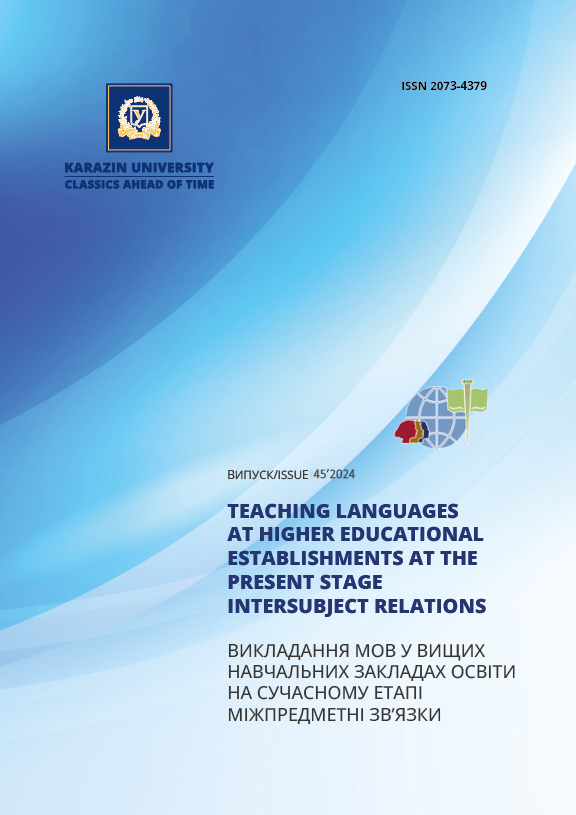Metacognitive practices in training for essay writing in a target language
Abstract
The relevance of the article stems from the problem of common student frustration with their essay writing performance in target language training. The issue is manageable when integrating essay writing skills with practices that use metacognitive strategies in cognitive processes. These strategies focus the thought of learners on personal development and consequently help them become more self-aware and proficient writers. The paperʼs purpose in this regard is to specify metacognitive practices as patterns of strategic behaviour and outline the rationale for their use in writing performance. In achieving this, the research employs methodological tools corresponding to current and archival materials analysis (student essays and teacher feedback techniques on their quality), behavioural observations, and case studies. Insights into self-assessments, self-efficacy beliefs, and the wide-ranging usefulness of various reflective procedures for advancing metacognitive abilities are among the objectives of this mixed-methods approach. The main results are embodied in certain transformations of theoretical ideas into specific learning tasks with metacognitive content and practices for their fulfilment, as well as in their visual illustrations and examples. The metacognitive model is part of these results, which frame metacognitive practices in the educational process. Despite its generalizing application, the model structure (personality – task – strategies at the level of cognitive and metacognitive thinking – teacher/peer student/group) limits the metacognitive practices functioning to strategic goals or attitudes aimed at cognition regulation. When the model is assumed, its extension through metacognition depicts these moments: (1) Stages of training metacognitive strategies: planning (analyzing essay requirements), monitoring (tracking progress during writing), evaluation (critically assessing written work), regulation (adapting strategies based on feedback), and others. (2) Skills development within these strategies. (3) Emotional factors. (4) Practical toolkits: reflection journals, peer reviews, and feedback integration.
Overall, metacognitive practice implemented within the educational curriculum alters writing from a challenging task into a structured, intentional learning experience, suggesting that further research is warranted to refine and expand on these findings.
Downloads
References
Albert, B. and Tullis, T. (2023). Measuring User Experience: Collecting, Analyzing, and Presenting UX Metrics. 3d ed. Elsevier Inc.: Morgan Kaufmann. Available at: https://www.scholarvox.com/reader/docid/889307 26/page/5 [Accessed 05 Aug. 2024].
Anderson, N.J. (2002). The Role of Metacognition in Second/Foreign Language Teaching and Learning. ERIC Digest. Washington DC: ERIC Clearinghouse on Languages and Linguistics. Available at: https://files.eric.ed.gov/fulltext/ED463659.pdf [Accessed 24 Aug. 2024].
Aristotle. (1907). De Anima. (R.D. Hicks, M.A., Trans.). Cambridge: At the University Press.
Aristotle. (MCMXXXIII [1978]). The metaphysics. Books I–IX. (H. Tredennick, M.A. Trans.). London: William Heinemann LTD; New York: G.P. Putman’s Sons.
Carson, L. (2021). Metacognition and Its Interactions with Cognition, Affect, Physicality and Off-Task Thought: Inside the Independent Learning Experience. 1st ed. London: Routledge. DOI: https://doi.org/10.4324/9781351027304
Cohoe, C.M. (2022). Knowing in Aristotle part 1: Epistēmē, Nous, and non-rational cognitive states. Philosophy Compass, 17(1), e12801. DOI: https://doi.org/10.1111/phc3.12801
D’Mello, S., Mills, C. (2013). Emotions while writing about emotional and non-emotional topics. Motivation and Emotion, 38(1), pp. 140-156. DOI: https://doi.org/10.1007/s11031-013-9358-1
Encyclopedia of educational theory and philosophy. (2014). D.C. Philips (Ed.). Los Angeles, London, New Delhi, Singapore, Washington DC: SAGE Publications, Inc.
Flavell, J.H. (1979). Metacognition and cognitive monitoring: A new area of cognitive-developmental inquiry. American Psychologist, 34(10), pp. 906-911. DOI: https://doi.org/10.1037/0003-066X.34.10.906
Flavell, J.H. (2000). Development of children’s knowledge about the mental world. International Journal of Behavioral Development, 24(1), pp. 15-23. DOI: https://doi.org/10.1080/016502500383421
Flavell, J.H. (2024). Metacognitive aspects of problem solving. The nature of intelligence. L.B. Resnick (Ed.). First published in 1976. London, New York: Routledge. Pp. 231-235.
Hacker, D.J., Dunlosky, J. and Graesser, A.C. (Eds.). (2009). Handbook of Metacognition in Education. New York and London: Routledge.
Haukås, Å. (2018). Metacognition in Language Learning and Teaching: An Overview. Metacognition in Language Learning and Teaching. Å. Haukås, C. Bjørke and M. Dypedahl (Eds.). New York: Routledge. Pp. 11-30.
Johansen, T.K. (2024). Aristotle on the Stages of Cognitive Development. Conceptualising Concepts in Greek Philosophy. G. Betegh and V. Tsouna (Eds.). Chapter 8. Cambridge: Cambridge University Press. Pp. 178-202.
Karagianni, G.K. (2024). Metacognitive Evolution: Bridging Aristotelian Wisdom and Autonomous Learning in the Digital Age. International Journal of Education and Research, 12(8), pp. 69-84.
Larkin, S. (Ed.). (2024). Metacognition and Education: Future Trends. London, New York: Routledge. DOI: https://doi.org/10.4324/9781003150602
Mazzoni, G. and Nelson, T.O. (Eds.). (2014). Metacognition and Cognitive Neuropsychology: Monitoring and Control Processes. First published 1998. New York: Psychology Press. DOI: https://doi.org/10.4324/9781315805733
Öz, H. (2005). Metacognition in Foreign/Second Language Learning and Teaching. Hacettepe Üniversitesi Egitim Fakültesi Dergisi (H.U. Journal of Education), 29, pp. 147-156.
Raoofi, S., et al. (2014). Metacognition and Second/Foreign Language Learning. English Language Teaching, 7(1), pp. 36-49. DOI: http://dx.doi.org/10.5539/elt.v7n1p36
Sethuraman, M. and Radhakrishnan, G. (2020). Promoting Cognitive Strategies in Second Language Writing. Eurasian Journal of Educational Research, 88, pp. 105-120.
Shen, B. and Wang, L. (2024). Development and validation of Questionnaire for Self-regulated Learning Writing Strategies (QSRLWS) for EFL learners. International Review of Applied Linguistics in Language Teaching. Available at: https://www.degruyter.com/journal/key/iral/0/0/html [Accessed 06 Aug. 2024]. DOI: https://doi.org/10.1515/iral-2023-0192
Sitko, B.M. (1998). Knowing how to write: Metacognition and writing instruction. Metacognition in educational theory and practice. D.J. Hacker, J. Dunlosky, and A.C. Graesser (Eds.). Lawrence Erlbaum Associates Publishers. Pp. 93-115.
Wells, A. (2019). Breaking the Cybernetic Code: Understanding and Treating the Human Metacognitive Control System to Enhance Mental Health. Frontiers in Psychology, 10:2621. DOI: https://doi.org/10.3389/fpsyg.2019.02621
Wenden, A. (1987). Metacognition: An Expanded View on the Cognitive Abilities of L2 Learners. Language Learning, 37(4), pp. 573-597. DOI: https://doi.org/10.1111/j.1467-1770.1987.tb00585.x

